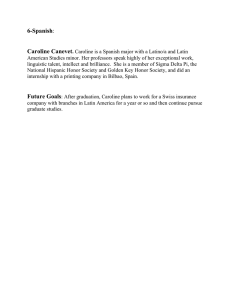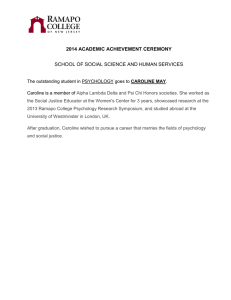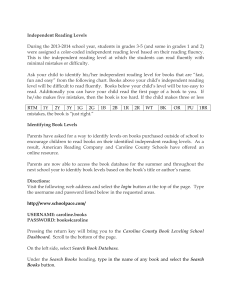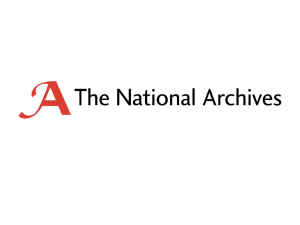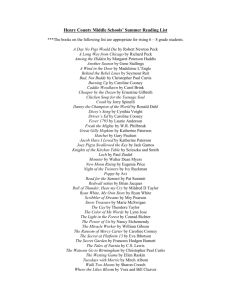Laqueur, "The Queen Caroline Affair: Politics as Art in the... Why does he call the Queen Caroline affair trivial? Do...
advertisement
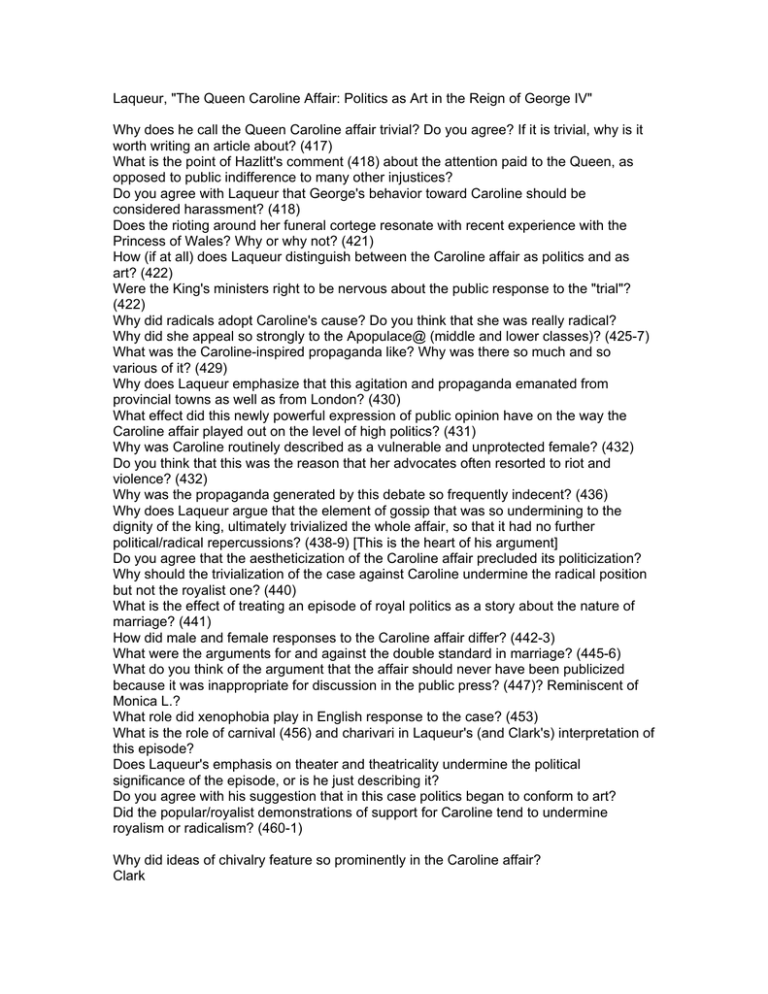
Laqueur, "The Queen Caroline Affair: Politics as Art in the Reign of George IV" Why does he call the Queen Caroline affair trivial? Do you agree? If it is trivial, why is it worth writing an article about? (417) What is the point of Hazlitt's comment (418) about the attention paid to the Queen, as opposed to public indifference to many other injustices? Do you agree with Laqueur that George's behavior toward Caroline should be considered harassment? (418) Does the rioting around her funeral cortege resonate with recent experience with the Princess of Wales? Why or why not? (421) How (if at all) does Laqueur distinguish between the Caroline affair as politics and as art? (422) Were the King's ministers right to be nervous about the public response to the "trial"? (422) Why did radicals adopt Caroline's cause? Do you think that she was really radical? Why did she appeal so strongly to the Apopulace@ (middle and lower classes)? (425-7) What was the Caroline-inspired propaganda like? Why was there so much and so various of it? (429) Why does Laqueur emphasize that this agitation and propaganda emanated from provincial towns as well as from London? (430) What effect did this newly powerful expression of public opinion have on the way the Caroline affair played out on the level of high politics? (431) Why was Caroline routinely described as a vulnerable and unprotected female? (432) Do you think that this was the reason that her advocates often resorted to riot and violence? (432) Why was the propaganda generated by this debate so frequently indecent? (436) Why does Laqueur argue that the element of gossip that was so undermining to the dignity of the king, ultimately trivialized the whole affair, so that it had no further political/radical repercussions? (438-9) [This is the heart of his argument] Do you agree that the aestheticization of the Caroline affair precluded its politicization? Why should the trivialization of the case against Caroline undermine the radical position but not the royalist one? (440) What is the effect of treating an episode of royal politics as a story about the nature of marriage? (441) How did male and female responses to the Caroline affair differ? (442-3) What were the arguments for and against the double standard in marriage? (445-6) What do you think of the argument that the affair should never have been publicized because it was inappropriate for discussion in the public press? (447)? Reminiscent of Monica L.? What role did xenophobia play in English response to the case? (453) What is the role of carnival (456) and charivari in Laqueur's (and Clark's) interpretation of this episode? Does Laqueur's emphasis on theater and theatricality undermine the political significance of the episode, or is he just describing it? Do you agree with his suggestion that in this case politics began to conform to art? Did the popular/royalist demonstrations of support for Caroline tend to undermine royalism or radicalism? (460-1) Why did ideas of chivalry feature so prominently in the Caroline affair? Clark What relation does she posit between gossip and "serious history"? (47) How does she characterize her argument in relation to Laqueur's? (47) Is her interpretation more feminist than Laqueur's? Why does Clark think it is important to analyze popular response to Caroline as a representation of plebeian families, rather than as a reflection of them? (48) Why was there such a strongly felt need for a new style of politics at this period? (50) Do you agree with Clark that the popular Caroline propaganda represented a way of engaging the illiterate masses (rather than a trivialization of the radical message, as Laqueur suggests)? (51) How does her interpretation of the role of chivalry differ from Laqueur's? (53) Where does Clark identify the sources of emotional power of the defense of Caroline? Relation to feminism (or protofeminism)?
